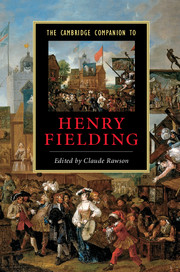Book contents
- Frontmatter
- Introduction
- 1 Henry Fielding’s life
- 2 Fielding’s theatrical career
- 3 Shamela
- 4 Joseph Andrews
- 5 Jonathan Wild
- 6 Tom Jones
- 7 Amelia
- 8 Fielding’s periodical journalism
- 9 Fielding and female authority
- 10 Fielding on society, crime, and the law
- 11 Fielding’s style
- 12 Fielding’s afterlife
- Guide to further reading
- Index
- Series List
5 - Jonathan Wild
Published online by Cambridge University Press: 28 July 2007
- Frontmatter
- Introduction
- 1 Henry Fielding’s life
- 2 Fielding’s theatrical career
- 3 Shamela
- 4 Joseph Andrews
- 5 Jonathan Wild
- 6 Tom Jones
- 7 Amelia
- 8 Fielding’s periodical journalism
- 9 Fielding and female authority
- 10 Fielding on society, crime, and the law
- 11 Fielding’s style
- 12 Fielding’s afterlife
- Guide to further reading
- Index
- Series List
Summary
Approach Fielding’s The History of the Life of the Late Mr Jonathan Wild the Great (1743) with an eye to the realistic depiction of character and human psychology and you will bump up against the literary equivalent of a brick wall. This is not to say that Fielding’s not interested in psychology - far from it - but that Jonathan Wild frames psychology rather as an instrument of ethics than as an aid to portrait-painting. Near the beginning, the narrator claims that reading the lives of great men may be instructive as well as entertaining: besides helping readers to attain 'a consummate Knowledge of human Nature in general; its secret Springs, various Windings, and perplexed Mazes', he asserts, 'we have here before our Eyes, lively Examples of whatever is amiable or detestable, worthy of Admiration or Abhorrence, and are consequently taught, in a Manner infinitely more effectual than by Precept, what we are eagerly to imitate or carefully to avoid.' This description is partly tongue-in-cheek - Fielding’s narrative is sharper and more satirical than the emphasis on exemplary morality would suggest - but the book is undoubtedly far less realistic in its depiction of people in their day-to-day lives than Daniel Defoe’s True and Genuine Account of the Life and Actions of the Late Jonathan Wild (1725), a contemporary chronicle of the rise and fall of the real-life thief-taker Jonathan Wild in 1720s London. (Though the difficulty of matching up the prolific Defoe with his anonymous publications has led a number of scholars to question his authorship of this life of Wild, Defoe’s recent biographer persuasively points to the 'obvious signs of Defoe’s unique style' and calls him 'certainly responsible for it'.)
- Type
- Chapter
- Information
- The Cambridge Companion to Henry Fielding , pp. 65 - 79Publisher: Cambridge University PressPrint publication year: 2007

